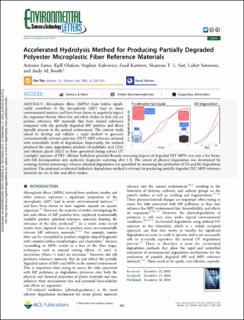| dc.contributor.author | Sarno, Antonio | |
| dc.contributor.author | Olafsen, Kjell | |
| dc.contributor.author | Kubowicz, Stephan | |
| dc.contributor.author | Karimov, Fuad | |
| dc.contributor.author | Sait, Shannen | |
| dc.contributor.author | Sørensen, Lisbet | |
| dc.contributor.author | Booth, Andy | |
| dc.date.accessioned | 2021-09-27T09:22:04Z | |
| dc.date.available | 2021-09-27T09:22:04Z | |
| dc.date.created | 2020-12-28T21:58:01Z | |
| dc.date.issued | 2020 | |
| dc.identifier.citation | Environmental Science and Technology Letters (ES&T Letters). 2020, . | en_US |
| dc.identifier.issn | 2328-8930 | |
| dc.identifier.uri | https://hdl.handle.net/11250/2783674 | |
| dc.description.abstract | Microplastic fibers (MPFs) from textiles significantly contribute to the microplastic (MP) load in many environmental matrices and have been shown to negatively impact the organisms therein. Most fate and effect studies to date rely on pristine reference MP materials that have limited relevance compared with the partially degraded MP particles and fibers typically present in the natural environment. The current study aimed to develop and validate a rapid method to generate environmentally relevant polyester (PET) MPF reference material with controllable levels of degradation. Importantly, the method produced the same degradation products (terephthalic acid (TA) and ethylene glycol (EG)) as those generated during natural UV (sunlight) exposure of PET. Alkaline hydrolysis provided linearly increasing degrees of degraded PET MPFs over just a few hours, with full decomposition into molecular fragments occurring after 3 h. The extent of physical degradation was determined by scanning electron microscopy, whereas chemical degradation was quantified by measuring the production of TA and EG degradation products. The proposed accelerated hydrolysis degradation method is relevant for producing partially degraded PET MPF reference materials for use in fate and effect studies. | en_US |
| dc.language.iso | eng | en_US |
| dc.publisher | American Chemical Society | en_US |
| dc.rights | Navngivelse 4.0 Internasjonal | * |
| dc.rights.uri | http://creativecommons.org/licenses/by/4.0/deed.no | * |
| dc.title | Accelerated hydrolysis method for producing partially degraded polyester microplastic fiber reference materials | en_US |
| dc.type | Peer reviewed | en_US |
| dc.type | Journal article | en_US |
| dc.description.version | publishedVersion | en_US |
| dc.source.pagenumber | 6 | en_US |
| dc.source.journal | Environmental Science and Technology Letters (ES&T Letters) | en_US |
| dc.identifier.doi | 10.1021/acs.estlett.0c01002 | |
| dc.identifier.cristin | 1863665 | |
| dc.relation.project | Norges forskningsråd: 268404 | en_US |
| dc.relation.project | Norges forskningsråd: 312262 | en_US |
| cristin.ispublished | true | |
| cristin.fulltext | postprint | |
| cristin.qualitycode | 1 | |

